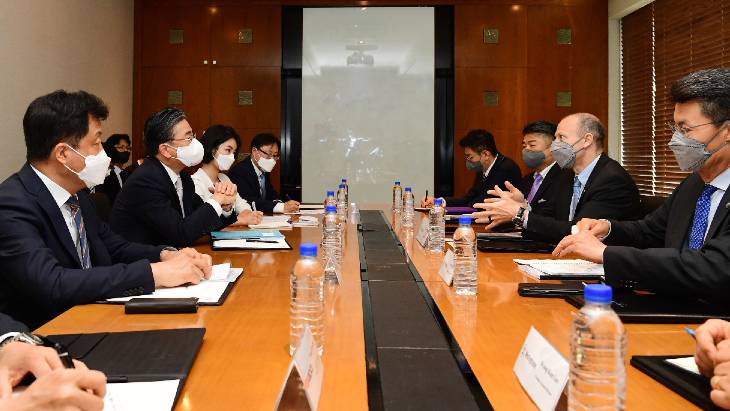It follows a meeting between KEPCO CEO Cheong Seung-il and Westinghouse's CEO Patrick Fragman on Wednesday in Seoul. Chung Jae-hoon, CEO of KEPCO subsidiary Korea Hydro & Nuclear Power (KHNP), which operates the country's existing nuclear power plants, and Fragman also held talks during his three day visit.
KEPCO, KHNP and Westinghouse are to set up a joint working group to draw up detailed plans.
The aim is to deepen cooperation in international nuclear power generation markets, KEPCO said, and follows the meeting between US President Joe Biden and President Yoon Suk-yeol in May which included an agreement to deepen ties in nuclear energy, with the discussions "expected to be the beginning of practical cooperation in the nuclear power sector between the companies of the two countries".
KEPCO's Cheong said the aim was to "develop a cooperative model for joint entry in the overseas large nuclear power plant market and expand cooperation to various other fields".
KHNP's Chung said that there would be stronger competitiveness if "Korea's excellent business management capabilities, technology and supply chain combine with the strengths" of Westinghouse.
Westinghouse acknowledged the constructive meeting between the companies and clarified that no agreement was negotiated or signed between the parties involving new reactor opportunities. Subsequent talks are planned to address outstanding issues about KEPCO/KHNP use of Westinghouse-licensed technology, a spokesperson said.
Westinghouse's Fragman is also visiting the Shin-Kori units 3 and 4 under operation and units 5 and 6 under construction to see "the operational and construction capabilities of Korean-style nuclear power plants", the KEPCO statement said.
Last week, Westinghouse signed a strategic cooperation agreement with Hyundai Engineering and Construction to jointly participate in global AP1000 plant opportunities.
South Korea's new president has vowed to reverse former President Moon Jae-in's policy of phasing out nuclear power, a policy which was brought in after he assumed office in 2017, and followed the 2011 Fukushima Daiichi accident in Japan. There has been speculation the new government will restart construction of two further APR-1400s as Shin Hanul units 3 and 4, continue to operate current nuclear reactors for longer and keep the country's energy share of nuclear at about 30%.
Four APR-1400s have also been built at Barakah in the United Arab Emirates, the first export order for the reactor design. The first two of these units were connected to the grid in August 2020 and September 2021, respectively.















